Pro-Bolsonaro rioters face jail terms of up to 30 years for terrorism
At least 1,200 Brazilians have been detained after violently marching on the government buildings in the national capital, Brasília
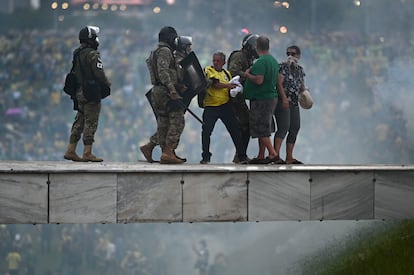
The pro-Bolsonaro invasion of the Brazilian Congress, the Supreme Court and the Presidential Palace in Brasília on Sunday, January 8, has led to 1,200 rioters being held in jail. About 1,500 were initially arrested, but 300 have been released on “humanitarian grounds” – many were old, sick, or had children in their care.
Those who remain imprisoned are, above all, the most violent. They were caught red-handed inside the government buildings. The men have been sent to the feared Papuda prison, while the women have been sent to the Colmeia facility – two jails on the outskirts of Brasília.
These protestors – many of whom vandalized the center of Brazilian democracy in a display of support for outgoing president Jair Bolsonaro – could be accused of very serious crimes. Some of the proposed charges include terrorism, violent abolition of the rule of law and even the instigation of a coup d’état.
Philipe Benoni – president of the National Association of Criminal Lawyers in Brasília – spoke to EL PAÍS by phone. He represents many of the capital’s defense lawyers, who have clients among the rioters. The attorney acknowledges that the case for defending these individuals will not be easy.
“Clearly, the accumulated sentences can reach more than 30 years. It must be understood that these were serious acts, unprecedented in the history of Brazil. Not even the 1964 coup reached this magnitude, where people dared to invade the institutions, the three branches of government.” Brazil’s military dictatorship lasted from 1964 until 1985. Since then, the country’s democracy has been uninterrupted.
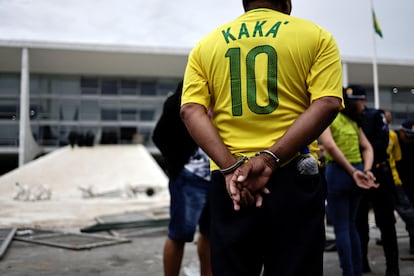
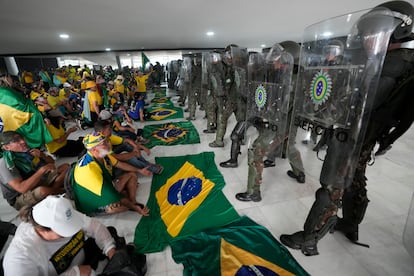
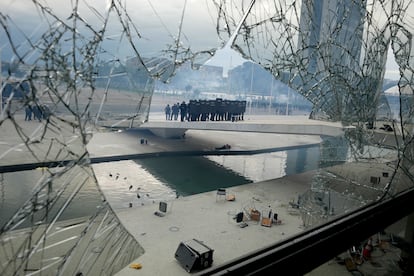
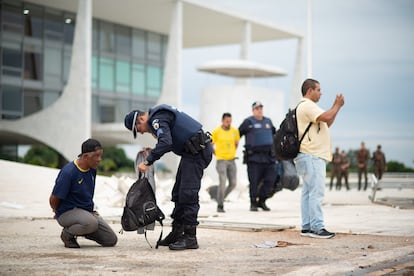
Former president Bolsonaro – who is currently in Florida for vacation and medical treatment – may also be charged for instigating his supporters to riot. The Supreme Court of Brazil has authorized the Prosecutor’s Office to open an investigation into the leader of the country’s right-wing Liberal Party – the largest political party in the Congress. Specifically, prosecutors intend to investigate the 67-year-old conservative for “instigation and intellectual authorship of the anti-democratic acts.”
Bolsonaro left Brazil shortly before the inauguration of President Luiz Inacio Lula da Silva – popularly known as “Lula” – to save face in front of his followers. Bolsonaro – who was elected president in 2018 – lost his re-election bid to Lula by a slim margin in the runoff of the presidential elections last October.
Lula, 77, previously served as president of Brazil from 2003 until 2010. While he brought his Workers’ Party back to power in the executive branch of government, Bolsonaro’s allies triumphed in the lower and upper chambers of Congress. However, in recent days, even far-right deputies and senators have expressed their repudiation for the January 8 attacks on the country’s Congress, which was not in session at the time. In addition to summoning his Cabinet and Brazil’s military leadership, Lula has also met with leaders of Bolsonaro’s political coalition, presenting a broad front in the reestablishment of the public order.
The Supreme Court has ordered the arrest of Anderson Torres – the head of public safety in the Federal District – for failing to call out the military police to stop the rioters. Torres – who served as the minister of justice during the Bolsonaro administration – has been accused of colluding with the invaders. When the riots broke out, he was travelling outside of Brazil. He is now in federal custody.
There are many indications that the radicals knew very well what had to be done to circumvent the security of the government buildings. In the police files compiled after the interrogations, it was stated that some rioters were armed with “sharp objects.” One of the prisoners, for example, declared that he would only use them in case of “being attacked by leftists.”
Once inside the presidential palace, the Bolsonaro loyalists stole ammunition and firearms. The passivity with which some of the local authorities acted is also being investigated. The governor of Brasília has been suspended from office for three months by the Supreme Court. However, despite all this chaos, the security services managed to detain everyone within less than three hours after the start of the assault, with no deaths.
The new inmates at Papuda prison face a rather bleak future. While it is a maximum security prison, it is blighted by the main structural problem of the Brazilian penitentiary system: overcrowding. It has capacity for 5,800 prisoners, but houses some 13,200 people – more than double. The health and safety conditions will likely come as a shock to the 770 detained men, many of whom hail from the country’s middle and upper classes. Among them are several retired soldiers.
The women’s prison – the new home for 420 Bolsonaristas – is a little better. Most of the women are from outside of Brasília and came to the capital to participate in the march, which ended in the storming of Brazil’s key institutions.
A few days ago – when the prisoners were provisionally transferred to a police sports complex for questioning – many lambasted the authorities about the conditions. Some even complained that the Wi-Fi was not working, according to a lawyer who went to review their situation.
Supreme Court Judge Alexandre de Moraes, who ordered the arrests, replied sarcastically when questioned about this by Brazilian media: “These terrorists – who caused chaos and committed crimes – now complain that they’re in prison. They want the prison to be a vacation camp! Let everyone be warned: Brazil’s institutions aren’t going to loosen up.”
De Moraes has been accused of authoritarianism in the past by lawmakers from various political parties. His bombastic statements may be used against him during the trials of the detained.
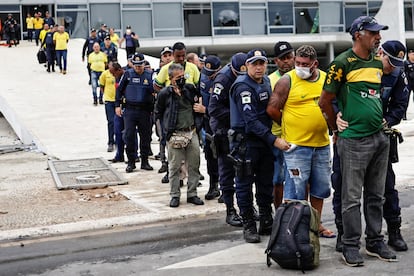
Attorney Benoni – speaking on behalf of Brasília’s defense lawyers – clarifies that, for the moment, the male coup plotters are in the prison’s temporary detention area, not in its main pavilions, where some of the country’s most-feared criminals reside, including gangsters from the country’s largest mafia, the Primer Comando da Capital (PCC).
As soon as the rioters arrived in prison, they received the standard outfit: pristine white uniforms, including shirts, pants and flip-flops. They were also vaccinated against Covid-19, on a mandatory basis. They are to be given three daily meals, unlimited access to books and 30 minutes a day with their lawyers.
According to Benoni, if the prisoners are moved to the general wings, they could share cells with up to 50 people. “If the police sports center seemed bad to them, this is much worse. And imagine, this is one of the best prisons in Brazil,” he remarked.
It is unclear whether the 1,200 prisoners can be held in preventive detention until their trial, as this form of incarceration is capped at 10 days under Brazilian law. Moreover, while the Supreme Court has mentioned serious crimes, such as terrorism, many of those under arrest did, in fact, demonstrate peacefully. It will be up to the court system to determine if behavior can be individualized, or if the detainees will be charged for committing a mass crime.
Analyzing each case is now up to the all-powerful Judge Moraes. He admits that it is “humanly impossible” for his court to analyze the situation of each prisoner in a reasonable amount of time. For this reason, the defense lawyers in Brasília have asked the Supreme Court to mobilize auxiliary judges, so that the legal process may be moved along more quickly.
Theoretically, the police should conclude the investigation of the events of January 8 within 30 days, but given the magnitude of the incident, it is almost certain that said period will be extended. A closed case will then be followed by complaints being filed with the Prosecutor’s Office. Subsequently, trials may begin.
Sign up for our weekly newsletter to get more English-language news coverage from EL PAÍS USA Edition
Tu suscripción se está usando en otro dispositivo
¿Quieres añadir otro usuario a tu suscripción?
Si continúas leyendo en este dispositivo, no se podrá leer en el otro.
FlechaTu suscripción se está usando en otro dispositivo y solo puedes acceder a EL PAÍS desde un dispositivo a la vez.
Si quieres compartir tu cuenta, cambia tu suscripción a la modalidad Premium, así podrás añadir otro usuario. Cada uno accederá con su propia cuenta de email, lo que os permitirá personalizar vuestra experiencia en EL PAÍS.
¿Tienes una suscripción de empresa? Accede aquí para contratar más cuentas.
En el caso de no saber quién está usando tu cuenta, te recomendamos cambiar tu contraseña aquí.
Si decides continuar compartiendo tu cuenta, este mensaje se mostrará en tu dispositivo y en el de la otra persona que está usando tu cuenta de forma indefinida, afectando a tu experiencia de lectura. Puedes consultar aquí los términos y condiciones de la suscripción digital.








































